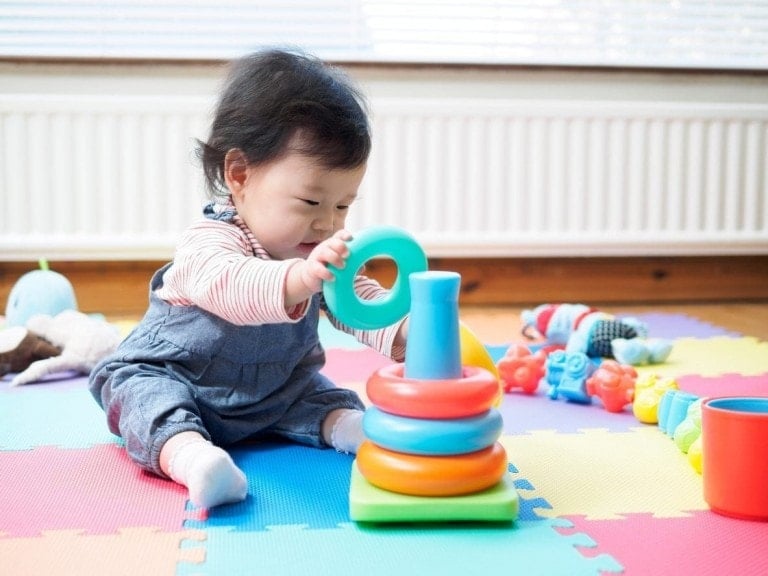The sleepless nights of new parenthood can be exhausting. Frequent feedings, diaper changes, and soothing midnight cuddles quickly take their toll. The quest for a whole night of sleep is a common topic of conversation among new parents.
After months of sleepless nights, you may ask: When will my baby sleep through the night? Every child is different, and comparing your baby’s sleep with other children can lead to unrealistic expectations. Here, we break down some misconceptions about sleeping through the night and explore when to expect your little one to achieve this much-longed-for milestone.
What is “Sleeping Through the Night”?
There is much confusion about what constitutes “sleeping through the night.” Sleep develops rapidly during the first few years of your little one’s life. At birth, your baby doesn’t have an established circadian rhythm, so they sleep in intervals throughout the day and night. Your little one’s circadian rhythm starts to develop at about 10-12 weeks, which coincides with their ability to sleep for more extended periods at night.1,2
Many parents think of “sleeping through the night” as walking out of their baby’s room at bedtime and waking up in the morning to greet them happily in their crib. However, sleeping for one large 12-hour stretch without waking is not common, and experts usually consider your little one to be sleeping through the night if they achieve at least 6 hours of sleep at a time. In addition, it is developmentally normal for your baby to wake during the night for a feed over 12 hours.3
The good news is that by 3-4 months, your little one may be sleeping at least five hours at a time, and, according to the National Sleep Foundation, 70%-80% of babies sleep through the night by nine months. Nonetheless, sleeping through the night requires several milestones to be reached, and, as with all areas of development, every child is different.4
So be patient; your little one will sleep through the night in their own time.
What Milestones Have Babies Met When Sleeping Through the Night?
Sleep is a developmental process. Just like learning to walk, there are milestones and skills your little one must develop to succeed. As your baby reaches each one, their ability to sleep for longer stretches at night improves.
Developmental Milestones That Indicate Your Baby Is Closer to Sleeping Through the Night
As your baby grows and develops, these key milestones often signal that they’re getting closer to sleeping through the night:
- Moro (startle) reflex decreases. The startle reflex is a sign of a developing nervous system and can often awaken your baby mid-sleep. This reflex gradually decreases over time and typically resolves around four months.5
- Your baby is gaining weight. Newborns need frequent feeding to support growth and development. As your little one gains weight steadily, their need for nighttime feedings decreases. Growing babies also take in more nutrients at each feeding, helping them stay asleep longer.
- The ability to self-soothe develops. It’s normal for babies to wake between sleep cycles. In the first few months, they often need comfort from a caregiver to fall back asleep. Over time, with a consistent routine, they learn to self-soothe and settle independently.
What Might Prevent Your Baby from Sleeping?
Your baby’s ability to sleep through the night will happen gradually. But even when your little one begins to sleep for longer stretches, some factors can interfere with their ability to sleep all night.
Common Reasons Babies Struggle to Sleep
Every baby is different, but these are some of the most common reasons your little one may be waking or having trouble staying asleep:
- Growth spurt. If your little one is going through a rapid change in growth, they may require more nutrients and begin waking again at night for feeds.
- Teething. Your baby’s first teeth can be painful, and it is not uncommon for symptoms to cause night waking.
- Milestone developments. When your little one is working on learning a new skill, such as crawling or sitting up, they may find it more challenging to wind down for sleep at night.
- Sleep environment. Your little one needs a dark room without distractions to develop healthy sleep habits. In addition, it is essential to consider the bedroom’s temperature and ensure your baby is comfortably dressed for sleep.
- Sleep regressions. Regressions can impact your baby’s behavior and commonly occur at around four months, 6-8 months, 10 months, and occasionally at 12 months. They usually last 1-4 weeks.
- Separation anxiety. If your little one is suffering from separation anxiety, they may lack the ability to self-soothe between sleep cycles and cry, seeking your comfort during the night.
Tips to Help Your Baby Sleep
The frustrating thing is that there is no definitive timeframe for answering the question of when your baby will sleep through the night. As disheartening as it can be to hear stories of other parents getting eight hours of uninterrupted sleep, rest assured (pun intended) that your little one will eventually sleep through the night.
In the meantime, it can be helpful to reach out for support. For example, pediatric sleep consultants can provide personalized advice on setting solid foundations for healthy sleep hygiene. In addition, don’t be shy about asking for assistance from friends or family who have been in your shoes. As the saying goes, “It takes a village to raise a child,” so don’t feel you have to do this alone.
And remember, like all stages of development, this too shall pass.





































